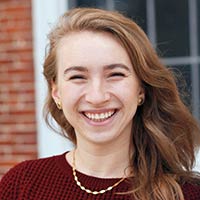How do two of this era’s most significant issues—political upheaval and climate change—affect the most vulnerable? Two seniors will soon embark on global journeys to find out.
Aleksandra Burshteyn and Benjamin Walker are among 40 young people selected as 2016 Thomas J. Watson Fellows. Fellows receive $30,000 for 12 months of travel. This year’s fellows are going to 67 countries.
A citizen of the United States and the Russian Federation, Burshteyn grew up hearing stories from her family about the fall of communism in the former USSR. She will spend her Watson year visiting countries undergoing similarly sweeping transitions, or where such changes are part of recent memory.

“It is easy to announce that communism or apartheid is over, that a ceasefire is begun, but another thing to implement that reality on the ground,” she said in her application. She wants to understand: “How do people grapple with memories and experiences of a world, of institutions and cultural values, that suddenly no longer exist?”

He plans to immerse himself in several communities displaced by the effects of climate change in Kiribati, Fiji, India, South Africa and Bolivia, spending time with farmers, families, activists and slum-dwellers. He plans to explore how people forced to migrate because of environmental upheaval understand “home.” Walker hopes to spend his career advocating for those most affected by climate change. William Sweet